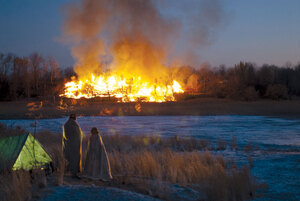Adaptation takes viewer down a harrowing ‘Road’
Often quoted and always relevant whenever the apocalypse enters a discussion, T.S. Eliot wrote in The Hollow Men: “This is the way the world ends/not with a bang, but a whimper.”
As seen in the success of Roland Emmerich’s eardrum-shattering 2012, people love a good world-destroying bang. The Road, John Hillcoat’s thrilling, faithful adaptation of Cormac McCarthy’s Pulitzer Prize-winning novel, is more about the bang in the whimper.

Road warriors · The Road, an adaptation of Cormac McCarthy’s novel of the same name, stars Viggo Mortensen as Man and Kodi Smit-McPhee as Boy. The film follows their journey through a post-apocalyptic world. - Photo courtesy of Dimension Films
In an America devastated by an apocalypse unseen and unnamed but for a flash of light pouring through a window, a father (Viggo Mortensen) and son (Kodi Smit-McPhee) make their way south from the Northeast. Along the way, they encounter murder, dimming hope and a lot of beautiful devastation.
McCarthy and Hillcoat are no strangers to an apocalyptic vision of the world. McCarthy’s masterpiece Blood Meridian rebranded the myth of the American west as a nihilistic hell-scape, a view taken by Hillcoat in his first feature, The Proposition, about law and lawlessness in the Australian frontier.
This is by no stretch of the imagination an action film, but even now the scenes that linger like fallout after the reel spooled up are the brief interludes of violence and terror that punctuate the wanderings of the father and son.
As much as The Road — with episodes about thieves and cannibals and a constant dialogue between the father and son about the importance of morality — is about the way humanity occupies a post-apocalyptic world, one of the key elements of both McCarthy and Hillcoat’s visions is the way in which the manmade apocalypse has destroyed the environment.
The sky is grey with ash, the world’s animals have died and the two protagonists are constantly troubled by the tumbling forests of the American Northeast. Perhaps even more than in the scenes of human conflict and compromise, Hillcoat’s cinematic translation of McCarthy’s vision accurately captures the terror in an end to the natural world — a fear of the modern age that burns with frightening relevance.
As he has in every role post-Hidalgo, Mortensen displays a range that escalates him to the upper echelon of working actors. As with his two films for David Cronenberg — A History of Violence and Eastern Promises — Mortensen creates a character utterly unique to any that he has played before. Though marked visually by his wild eyes and rugged beard, the man’s crazed desperation in safeguarding his son and his cold devotion to teaching him survival tactics are ingrained in every aspect of a complex performance.
As the boy, Smit-McPhee has a daunting task both in sharing the screen with a seasoned dramatic actor like Mortensen and, more challenging still, developing a character whose background is conceptually utterly foreign to the audience. All the boy has ever known is the traumatic world of violence — a common theme for McCarthy — and to Smit-McPhee’s credit he instills the conflicted young wanderer with a palpable and dynamic personality.
Ultimately, The Road is imperfect as a narrative structure, not as a visual and thematic experience. The episodic way in which the story is told removes some of the gravitas of the story: Events are linked by the perspective of the father and son, but, as is true with McCarthy’s novel, few scenes are given weight or precedence over the others.
The film feels somewhat empty at a core around which potent imagery and relevant themes swirl in beautiful chaos — and Hillcoat’s fatal flaw might be simply refusing to deviate from the source material to give his own vision more emotional weight. The structure worked perfectly for McCarthy’s words, but not as well for Hillcoat’s images.
The film’s post-apocalyptic journey structure necessarily draws comparison to the more linear Children of Men. Essentially, both films share the same flaw in their final frames — which ring hollow against all that comes before. Director Alfonso Cuaron was reportedly forced to change the original ending of his film, but, as with the rest of The Road, Hillcoat’s ending is merely following McCarthy’s vision.
The Road left me wanting not necessarily closure, but simply more of the vision. It is a testament to Hillcoat’s abilities — and the strength of his actors — that I didn’t want to leave the horrible world he captured. There might not have been much more to add about the downfall of humanity by the time The Road ends on its own little whimper, but that doesn’t mean the film would have suffered from more of the pure cinematic poetry of the graphic adventures of father and son in a twisted world.
